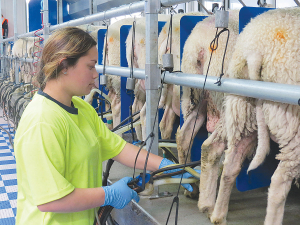Maui Milk achieves grass-fed certification in NZ
Sheep milk processor Maui Milk has achieved grass-fed certification of milk supply against the AsureQuality Grass-Fed Scheme.
 Dairy sheep and goat farmers are being told to reduce milk supply as processors face a slump in global demand for their products.
Dairy sheep and goat farmers are being told to reduce milk supply as processors face a slump in global demand for their products.
Dairy sheep and goat farmers are being told to reduce milk supply as processors face a slump in global demand for their products.
This month Maui Milk abruptly ended its milking season one month earlier, forcing 15 Waikato-based farmer suppliers to dry off their flocks.
Hamilton-based Dairy Goat Co-operative (DGC) is asking farmer suppliers to reduce milk supply for the next season, possibly by one-third.
DGC chief executive David Hemara told Rural News that the reduction is necessary to better balance incoming milk against forecast product sales for 2024-25.
"This is a continuation of a cap that we have applied for several seasons and reflects changing demand levels in some markets since Covid.
"While the final amount of milk per shareholder is yet to be finalised, we have advised shareholders that we expect that they will be asked to reduce supply to around two-thirds of normal level."
According to Hemara, the global supply/demand situation for goat milk has been impacted by several factors including declining birth rates internationally and the collapse of the Daigou informal sales channel to China during Covid.
He says there has also been a structural change in the China consumer market where over the last four years China consumers have moved strongly to support Chinese domestic brands.
"This same impact has occurred in the infant formula segment," Hemara says.
The drop in demand for goat milk infant formula is mirrored in the sheep milk sector.
Maui Milk chief executive Greg Hamill says Maui Milk is one of many companies being impacted by the imbalance between supply and demand for New Zealand sheep dairy products.
"I'm in constant communication with our suppliers as we work through the end of this season's production and options for next season," he told Rural News.
Dairy sheep farmers are paid between $15 to $17.50/kgMS for milk. There's also a taxpayer link to the sheep milk sector. Spring Sheep Milk is 50% owned by state farmer Landcorp, which trades under the brand name Pāmu. Rural News understands Spring Sheep has finished products sitting in warehouses as global demand stagnates.
Spring Sheep chief executive Nick Hammond told Rural News that the primary segment of the industry where there has been a slowdown is in the China ingredients market, mainly due to recent declines in the birth rates.
"This has resulted in excess inventory as the market has adjusted. We do see this stabilising over time which is further supported by the removal of the tariff on milk powder imports from New Zealand into China from the start of this year," he says.
Hammond points out that Spring Sheep has been aware of these dynamics for some time and as such have proactively focussed on the diversification of both our products and the markets they serve.
"We have also actively calibrated our milk production growth over time to align with the current demand from our customers and our processing capabilities. This balance is crucial for maintaining balance and sustainability of future growth."
Hammond remains optimistic about the sheep milk sector.
"Looking ahead, we are excited to share some promising new opportunities that will bolster our industry and create significant growth platforms."
Arable growers worried that some weeds in their crops may have developed herbicide resistance can now get the suspected plants tested for free.
Fruit growers and exporters are worried following the discovery of a male Queensland fruit fly in Auckland this week.
Dairy prices have jumped in the overnight Global Dairy Trade (GDT) auction, breaking a five-month negative streak.
Alliance Group chief executive Willie Wiese is leaving the company after three years in the role.
A booklet produced in 2025 by the Rotoiti 15 trust, Department of Conservation and Scion – now part of the Bioeconomy Science Institute – aims to help people identify insect pests and diseases.
A Taranaki farmer and livestock agent who illegally swapped NAIT tags from cows infected with a bovine disease in an attempt to sell the cows has been fined $15,000.